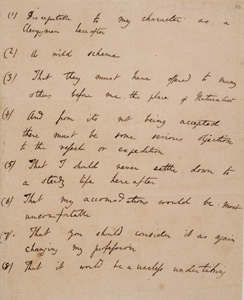'Not a finished naturalist'
 |
|---|
| Darwin's list of his father's objections to the voyage. CUL DAR 97, f. B10 |
The little Beagle set sail from Plymouth on 27 December 1831. Chosen as much for his social skills as for his scientific ability, Darwin had much to learn. Between bouts of seasickness – never overcome – he began avidly ‘collecting, observing, & noting anything worthy to be noted’. His cramped cabin housed an extraordinary number of books as well as geological hammers, a microscope, a clinometer for measuring slopes, and a container for botanical specimens: ‘I have procured [a] case of good strong pistols & excellent rifle for 50£: good telescope, with compass 5£’.
Darwin’s first independent scientific work was testing and identifying rock samples in the Cape Verde Islands. He also collected ‘a great number of curious and beautiful animals’ including several specimens of octopus, mistakenly thinking he was the first to observe them changing colour. Writing home, he reassured his father: ‘I think – if I can so soon judge – I shall be able to do some original work in Natural History’.

